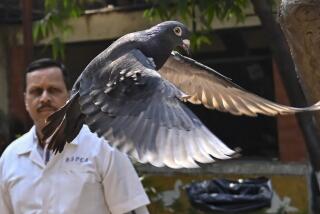West German Bird Experts Puzzled by Failure of Homing Pigeons to Find Home
- Share via
HANOVER, West Germany — Experts are still puzzling over why vast numbers of homing pigeons have lost their way this summer and never arrived back in their owners’ lofts.
In one instance a Bremen pigeon-fanciers’ club sent off a truckload of its finest birds early in the morning to the starting point of a race 180 miles from home.
The birds were released at 9.30 a.m. Under normal conditions, most would have fluttered over hill and dale, arriving in their home lofts the same day and triggering a recording device. The owner of the fastest bird receives a prize put up by the club.
Normally the winning bird would have been back in four hours. Instead it took seven hours to find its way home, and by the next morning only a quarter of the birds had returned. After a few days the fanciers calculated that they had lost about half the racers.
The story has not been uncommon in many areas of Europe this summer. Some clubs in West Germany said they had already called a halt to all races for the rest of the season because of the high losses.
Races up to 480 Miles
In normal times a fancier can expect to lose 10% to 15% of released birds. During races, which can extend up to 480 miles, some birds always fly into high-voltage power lines or just get lost.
Despite being able to fly at 85 m.p.h. in short bursts, some pigeons also fall victim to birds of prey.
But this year’s losses are abnormal. German fanciers fear that it may take years to breed replacement stock.
Many have phoned Roswitha and Wolfgang Wiltschko of Frankfurt University, two of West Germany’s leading researchers into pigeon navigation.
The fanciers have plenty of ideas as to what is wrong. One man said it is all to blame on the fact that 1988 is a leap year.
How pigeons navigate is only partly understood, but it is known that the birds are sensitive to magnetic fields.
Solar Flare Disturbances
Some fanciers say the Earth’s magnetic field was disturbed during the summer races by solar flares caused by gas explosions on the sun, and this might have sent the birds off course.
The two Frankfurt zoologists discount this. In many years of experiments they have established that pigeons have several ways of orienting themselves.
According to Roswitha Wiltschko, a magnetic storm could well have disturbed the birds’ orientation, but on its own that would not be enough to explain this summer’s huge losses.
During its lifetime a pigeon learns to tell direction from the position of the sun. Its natural body “clock” tells it what time of day it is and where the sun should be in the sky.
Older pigeons rely mainly on this “sun compass” and navigate by magnetic fields only under a heavily overcast sky. The Wiltschkos have found that the birds also recognize landscape features and smells.
Navigation Problems
Roswitha Wiltschko says the big losses could only be explained by a rare coincidence of individual navigation problems.
She also doubts suggestions that the fanciers have been applying stimulant drugs that can lead to the birds’ flying without a break until they drop from exhaustion.
Doping is becoming a problem, though. The Wiltschkos often get inquiries from fanciers attempting to give their birds hormone treatment. The sport is highly competitive, with prizes for top birds running as high as $10,500.
The oldest form of hormone treatment in the sport is sex deprivation. The cocks and hens are kept apart until the race, which encourages the cock to fly home at full speed.
That is one form of orientation that does not seem to have been disturbed yet.
More to Read
Sign up for Essential California
The most important California stories and recommendations in your inbox every morning.
You may occasionally receive promotional content from the Los Angeles Times.













